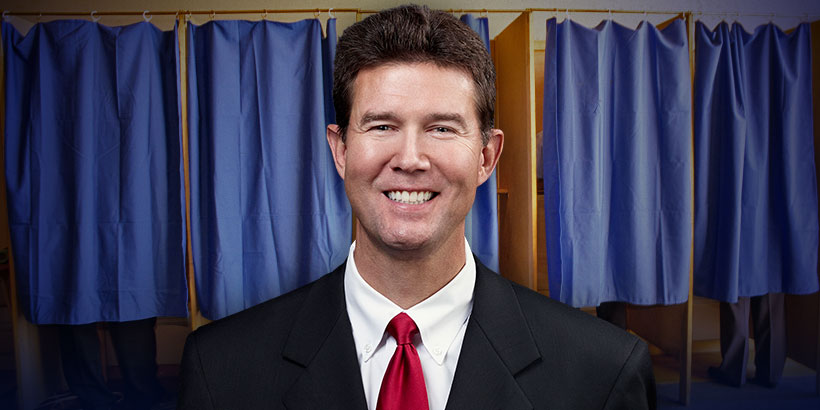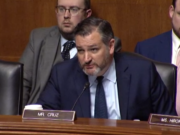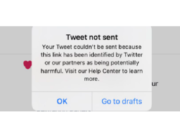If an elected official views a political advertisement as misleading, or even false, should that politician have the power to prevent citizens from viewing the ad?
Although some members of Congress are warming up to the idea of politicians deciding what constitutes an “honest ad,” most Americans with any concern for the future of free expression would answer this question with a resounding, “No!”
However, last week, Alabama Secretary of State John Merrill bragged in a press release that he successfully pressured a private company to take down a political ad because he viewed the ad as “misleading.”
According to the press release, a super PAC supporting Democratic U.S. Senate candidate Doug Jones placed the ad on YouTube and other digital platforms.
Once the Secretary of State’s Office became aware of the ad, “Secretary Merrill’s team contacted the Media and Advertising team at Google (YouTube’s parent company) and through several intense discussions” convinced the company to remove the ad from all of its platforms.
The precise spoken content of the ad in question is as follows: “If you don’t vote, and Roy Moore – a child predator – wins, could you live with that? Your vote is public record, and your community will know whether or not you helped stop Roy Moore. On Tuesday, December 12th, vote for Doug Jones for Senate.”
Whether one voted or not is, in fact, public record. Taken at face value, the ad is accurately informing voters of this fact. But it is also easy to understand the Secretary of State’s concern that many voters would interpret this ad to mean that whom they vote for is also public record. It is not, and Secretary Merrill worried that such an interpretation would dissuade Alabamians from voting due to “fear of retribution for how they chose to cast their ballot.”
Did the group behind this ad assume that many voters would be led to believe that the content of their ballot is public information? Maybe. Can the content of the ad be accurately defined as “incorrect or inaccurate information,” as the Secretary of State’s office labels it? It depends on whom you ask.
The group behind the ad, for example, said, “The Secretary of State is distorting the intent of the ad. Whether or not someone votes is public knowledge. The ad is not improper. Standing up and voting against Roy Moore on December 12 is critically important to the future of our state and we are going to make sure all Alabamians know that.”
Regardless of the answers to these questions, no public official should have the power to prevent the public from hearing this speech. Indeed, the Alabama Secretary of State does not (officially) have that power. But the fact remains that an elected official used his position to effectively censor an ad that opposed his party’s candidate in a U.S. Senate race.
Even assuming Merrill had the best of intentions and merely sought to prevent confusion among the electorate, this is a dangerous precedent to set. The Secretary of State made a threat of legal action against a private company for providing a platform for certain political speech. If companies such as Google begin caving to such threats, politicians in power will have the de facto ability to manipulate political discourse.
Merrill’s press release states that his office simply convinced Google that the ad violated its own internal advertising policies. But the statement also says that “many references to Alabama State Law” were part of those “intense discussions” with Google. The Secretary of State does not specify which laws were referenced, but clearly such “references” would only have been made in response to pushback from Google.
It is likely that the hostile climate in Washington surrounding tech companies and online speech contributed to Google’s decision to comply with this “request.” Though some seem intent on taking us there, no one should look forward to a future where Google or any other tech firm “works with” politicians to censor political speech deemed unfit for the public.
This episode in Alabama also highlights some of the more alarming consequences of overbroad donor disclosure mandates. Unlike the sacred secret ballot, donations as small as $200 to federal candidates are public record, and the searchable government database where this information is stored includes donors’ names, home addresses, occupations, and employers.
The exact same concerns expressed by Secretary Merrill regarding “fear of retribution” deterring participation apply equally to donor disclosure. Many Americans would rather not have their political affiliations, coupled with their personal information, be a permanent part of public record. This information has, in fact, been used in “name and shame” campaigns by political opponents. Individuals have also been targets of violent threats and have lost their jobs as a result of donor disclosure laws violating their privacy.
Those who understand the value of the secret ballot should also understand the value of donor privacy. When considering the speech-chilling effects of compulsory donor disclosure in combination with the fact that a public official just used threats of legal action to remove a political ad from the internet, a clear lesson emerges: Censorship comes in many forms.














